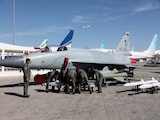In a push to make India drug-free, Union Home Minister Amit Shah on Friday vowed to destroy drug cartels by 2029. Speaking to NDTV Editor-in-Chief and CEO Rahul Kanwal at the Bihar Power Play conclave in Patna, he said their fight against drugs has been going on for the past four years with "very good" planning.
"It has been going on from the district level to the state level to the Indian government, and the plan has been very successful," Shah said when asked if they would fight drug cartels with the same intensity they have worked to eliminate Maoists.
"We have broken the record of arresting drug traffickers and drug dealers in the last three years," he said.
"Now, the time has come to destroy the cartel instead of the drug trade so that this network is destroyed forever. I have complete faith that in the next four years, all the state governments and the Centre will destroy the drug cartel, whether it is at the district level, state level or national level," Shah said.
The senior Bharatiya Janata Party (BJP) leader also said that they have made "thorough arrangements" at the three routes used to smuggle drugs.
"One is from the river, the second is from Pakistan, and the third is from Myanmar. We have made thorough arrangements to stop all three routes," he said.
Last year, anti-narcotics agencies across the country seized 1,483 kg of cocaine, which was about 78 times higher than what was seized in 2020 and about five times higher than in 2023, according to a report by the Narcotics Control Bureau (NCB).
The NCB, in its annual report for 2024 released in September, said that other drugs that saw a "sharp" increase included mephedrone (also known as 4-MMC or meow meow), a much-abused party drug, as the agencies seized 3,359 kgs of the contraband across the country in 2024 as compared to 275 kgs in 2020.
The federal anti-narcotics agency, which comes under Shah's Ministry of Home Affairs, also said that a "sharp" spike has been seen in the sightings and recovery of drug-laden drones coming into India from Pakistan across the international border in Punjab over the last four years.
These drones pose a "significant" threat to the country's internal security, it said.
"The use of drones for cross-border smuggling of narcotics has emerged as a significant threat to India's internal security, particularly along the Pakistan border in Punjab. This evolving modus operandi has replaced traditional smuggling methods and poses a complex challenge for law enforcement and border security agencies," the report said.
In 2024, the number of such seizures "rose manifold", reaching 179 cases as compared to just three cases in 2021. The recovered drug consignments largely included heroin and opium, the report said.
The total drug recovery was about 236 kgs.
The 'Death Crescent' (comprising the countries of Iran, Afghanistan, and Pakistan) remains the "primary" source of heroin, Amphetamine-Type Stimulants (ATS), and hashish entering the country through the western coast, while the 'Death Triangle' (Myanmar, Laos, and Thailand) serves as the "main supplier" of synthetic drugs, particularly methamphetamine smuggled through India's eastern coast. the report said.
Taking drugs through injections was a "rising concern" as in 2024 the agencies seized over 2.75 lakh units (injections) valued at Rs 4.54 crore with states like Punjab and Maharashtra witnessing "high volumes" of their seizure, the report said.















